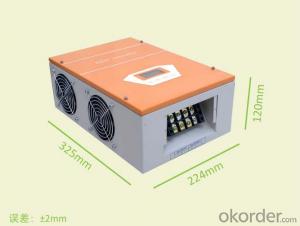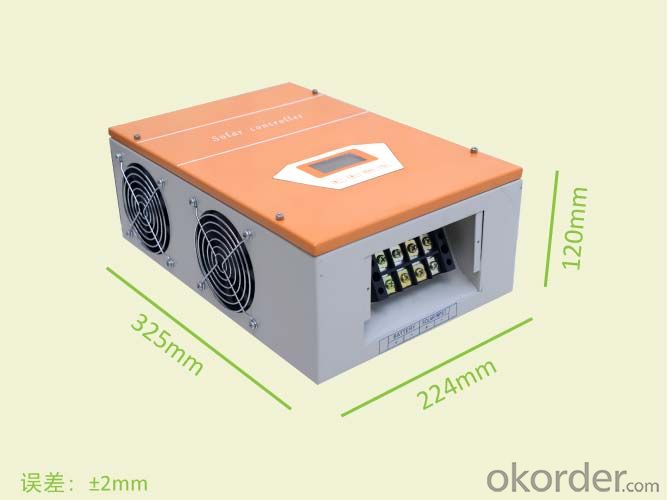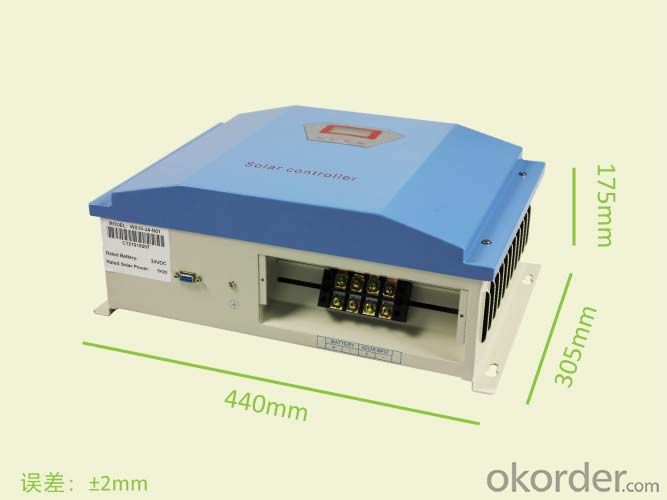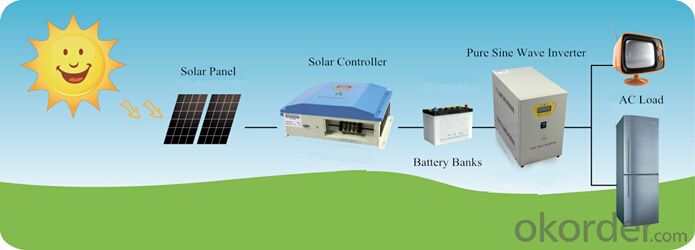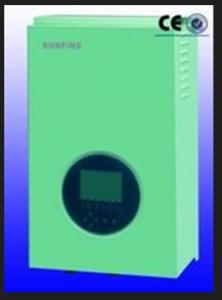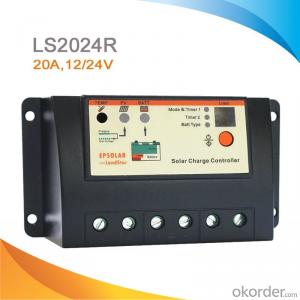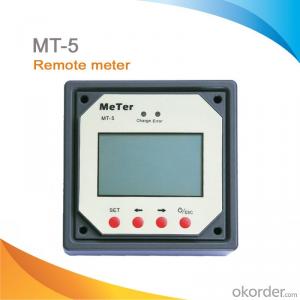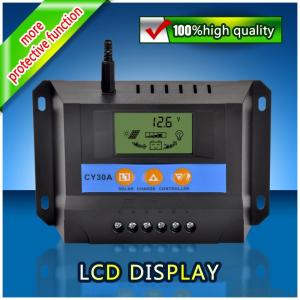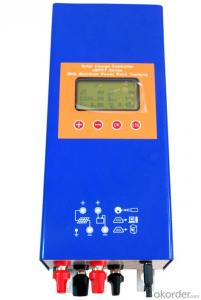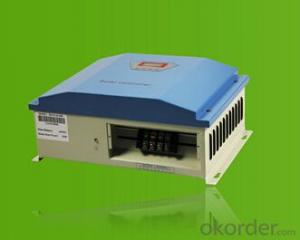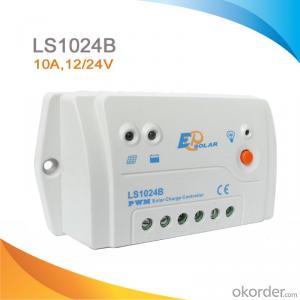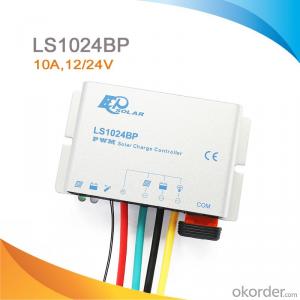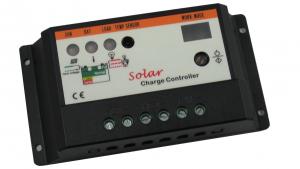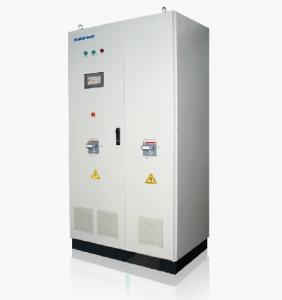Solar Hot Water Controllers with 3kW MPPT Solar Charge Controller
- Loading Port:
- Shanghai
- Payment Terms:
- TT or LC
- Min Order Qty:
- 1 unit
- Supply Capability:
- 10000 unit/month
OKorder Service Pledge
OKorder Financial Service
You Might Also Like
I. PRODUCT INTRODUCTION
Solar controller is control device which can control solar panel and transform solar energy into electricity then store to the battery bank. Solar controller is the most important part in off-grid system, whose performance has much effect on life expectancy and operation of the whole system, especially the battery expectancy. Or battery service life will be shortened by over charge or over discharge.
II. PERFORMANCE FEATURES
Superior military-grade components to ensure the product stability.
Perfect protection function, thus the system has higher reliability.
Check and set all operation parameters as requirement from LCD display.
PWM stepless unload mode, which burn the excess power into Dump load, making the battery charging in best status.
III. APPLICATION AREAS
Standalone Photovoltaic power station
Standalone Domestic household photovoltaic power system
Mobil communication base stations, expressway and other non-residential regions.
Coastal islands, remote mountainous, border posts for regions shortage of or without electricity.
Government demonstration projects, landscape lighting project etc.
IV. 3KW TECHNICAL PARAMETERS
Product model | WS30-48-N00 | WS30-96-N00 | WS30-110-N00 | WS30-120-N00 | WS30-220-N00 |
Rated battery power | 48V | 96V | 110V | 120V | 220V |
Rated solar input power | 3kW | 3kW | 3kW | 3kW | 3kW |
Floating charge voltage | 58V | 116V | 133V | 145V | 266V |
Max Open Circuit Voltage | 100V | 200V | 230V | 250V | 458V |
Dimensions (L x W x H) | 442×307×172 mm | ||||
Net weight | 7kg | ||||
Display mode | LCD | ||||
Cooling | Fan | ||||
Protection level | IP20(Indoor) | ||||
Quiescent current | ≤20 mA | ||||
Protection functions | Battery over charge; battery anti-reverse-connection; solar reverse charge protection; solar anti-reverse-connection; lightning protection. | ||||
Ambient temperature | -20~+55℃ | ||||
Ambient humidity | 0~93%, without condensing | ||||
Working altitude | ≤4000m | ||||
In order to serve our customers better, our company can adjust parameter configuration according to customer’s requirement. | |||||
V. APPENDIX
Optional Functions | ||
Ø Temperature compensation function | Ø Dry-connect output signal function | Ø RS communication function |
Optional Accessories | ||
Ø Ethernet Module | Ø GPRS | Ø SD card storage module |
Ø RS485-USB converter | Ø RS485-RS232 converter | Ø RS232-USB converter |
Friendly reminder: Customers, who will order the solar controller, need to provide the following information | ||
Ø Rated battery voltage | Ø Rated solar power | Ø With or without additional functions |
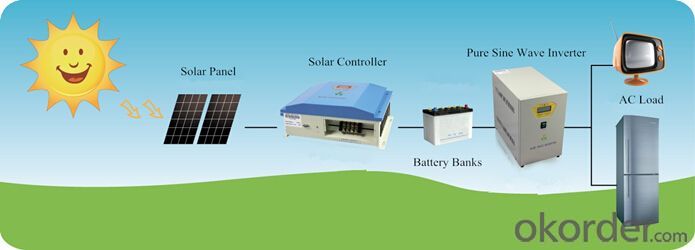
- Q: Can a solar controller be used with solar water pumps?
- Solar water pumps can indeed be used with a solar controller. The solar controller is an indispensable part of any solar power system, including solar water pumps. Its main function is to regulate and optimize the flow of electricity from the solar panels to the pump. Not only does it prevent battery overcharging and protect against voltage fluctuations, but it also ensures that the pump operates efficiently. Moreover, a solar controller may also come equipped with advanced features such as MPPT (Maximum Power Point Tracking) technology. This technology maximizes the power output from the solar panels, thereby further enhancing the performance of the solar water pump system. Consequently, it is highly recommended to utilize a solar controller in conjunction with solar water pumps in order to achieve better control, protection, and overall system performance.
- Q: What is the maximum number of user profiles supported by a solar controller?
- The maximum number of user profiles supported by a solar controller can vary depending on the specific model and manufacturer. Generally, solar controllers can support a range of user profiles, with some models accommodating a few profiles and others able to handle dozens or even hundreds of profiles. It is recommended to refer to the product specifications or contact the manufacturer for accurate information on the maximum number of user profiles supported by a particular solar controller.
- Q: How does a solar controller handle temperature fluctuations?
- A solar controller handles temperature fluctuations by continuously monitoring the temperature of the solar panels or batteries and adjusting the charging parameters accordingly. It uses temperature sensors to detect changes in temperature and modifies the charging voltage or current to ensure optimal charging and prevent damage to the battery or panels. This helps to maximize the efficiency and lifespan of the solar system, even in varying temperature conditions.
- Q: Can a solar controller be used with different types of solar batteries?
- Yes, a solar controller can be used with different types of solar batteries. The primary purpose of a solar controller is to regulate and control the charging process of the solar batteries. It ensures that the batteries are charged optimally and prevents overcharging or undercharging. Solar controllers are designed to work with various types of batteries such as lead-acid, lithium-ion, gel, or AGM batteries. They typically have adjustable charging parameters to accommodate the specific requirements of different battery chemistries. However, it is important to choose a solar controller that is compatible with the specific type of battery being used to ensure proper charging and maximize the lifespan of the batteries.
- Q: How does a solar controller handle battery short circuit protection?
- A solar controller handles battery short circuit protection by constantly monitoring the current flow between the battery and the solar panels. If a short circuit occurs, the controller immediately detects the sudden increase in current and activates a protection mechanism. This can involve cutting off the current flow from the panels to the battery, preventing any damage or overheating that could occur.
- Q: Can a solar controller be used in a solar-powered electric airplane system?
- Yes, a solar controller can be used in a solar-powered electric airplane system. A solar controller is responsible for regulating the flow of electricity from solar panels to the batteries, ensuring efficient charging and preventing overcharging. In a solar-powered electric airplane system, the solar controller would play a crucial role in managing the electricity generated by the solar panels and supplying it to power the aircraft's electric systems and recharge the batteries.
- Q: What is the role of a battery voltage sensor in a solar controller?
- The role of a battery voltage sensor in a solar controller is to monitor the voltage level of the battery, ensuring that it remains within safe operating limits. This sensor helps to prevent overcharging or deep discharging of the battery, which can lead to damage or reduced lifespan. By continuously measuring the battery voltage, the solar controller can regulate the charging process and optimize energy flow from the solar panels to the battery, maximizing efficiency and ensuring the battery's longevity.
- Q: Can a solar controller be used in a solar-powered space elevator system?
- No, a solar controller cannot be used in a solar-powered space elevator system. A solar controller is designed to regulate the charging and discharging of batteries in solar power systems, while a space elevator system requires a completely different set of components and technologies to function, such as strong and lightweight materials, a counterweight, and a climbing mechanism.
- Q: How does a solar controller handle high voltage spikes or surges?
- A solar controller is designed to handle high voltage spikes or surges in a few different ways. Firstly, most solar controllers have built-in overvoltage protection, which means they can withstand higher voltages than what they are rated for without getting damaged. This feature helps to protect the controller from voltage spikes that may occur during thunderstorms or other electrical disturbances. Additionally, solar controllers often employ surge protection devices such as varistors or transient voltage suppressors. These devices are designed to divert excess voltage away from the controller, ensuring that it does not get overwhelmed by the sudden surge. Furthermore, some solar controllers also have voltage clamping circuits that limit the voltage to a safe level. These circuits act as a safety net by preventing the voltage from exceeding a certain threshold, even if a spike or surge occurs. Overall, the combination of overvoltage protection, surge protection devices, and voltage clamping circuits allows a solar controller to effectively handle high voltage spikes or surges. By absorbing, diverting, or limiting the excess voltage, the solar controller ensures the safety and longevity of the system it is connected to.
- Q: How does a solar controller handle the switching of loads?
- A solar controller handles the switching of loads by monitoring the battery voltage and determining when it is necessary to activate or deactivate the loads. It regulates the flow of electricity from the solar panels to the battery and from the battery to the loads, ensuring the optimal use of energy and preventing overcharging or deep discharging of the battery.
Send your message to us
Solar Hot Water Controllers with 3kW MPPT Solar Charge Controller
- Loading Port:
- Shanghai
- Payment Terms:
- TT or LC
- Min Order Qty:
- 1 unit
- Supply Capability:
- 10000 unit/month
OKorder Service Pledge
OKorder Financial Service
Similar products
Hot products
Hot Searches
Related keywords
